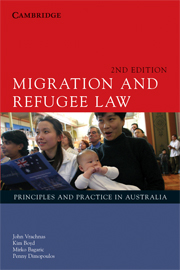Book contents
- Frontmatter
- Contents
- Table of cases
- Table of statutes
- Preface to the second edition
- Acknowledgments
- 1 Historical context to migration
- 2 Immigration control: an overview
- 3 Basic migration legislation and policy
- 4 The visa system and application procedures
- 5 Family and interdependency migration and other Australia-based visas
- 6 Business and investment visas
- 7 Skill-based visas
- 8 Temporary visas
- 9 Miscellaneous visas
- 10 Common visa requirements
- 11 Compliance: unlawful non-citizens, removal and deportation
- 12 History of the refugees convention and definitional framework
- 13 Refugee and humanitarian visas: the statutory structure
- 14 Convention grounds
- 15 Persecution
- 16 Well-founded fear of persecution
- 17 Limits on protection of refugees – cessation, exclusion exceptions and protection by another country
- 18 Time for a fundamental re-think: need as the criterion for assistance
- 19 The determination and review process for migration and refugee decisions
- Index
19 - The determination and review process for migration and refugee decisions
Published online by Cambridge University Press: 05 June 2012
- Frontmatter
- Contents
- Table of cases
- Table of statutes
- Preface to the second edition
- Acknowledgments
- 1 Historical context to migration
- 2 Immigration control: an overview
- 3 Basic migration legislation and policy
- 4 The visa system and application procedures
- 5 Family and interdependency migration and other Australia-based visas
- 6 Business and investment visas
- 7 Skill-based visas
- 8 Temporary visas
- 9 Miscellaneous visas
- 10 Common visa requirements
- 11 Compliance: unlawful non-citizens, removal and deportation
- 12 History of the refugees convention and definitional framework
- 13 Refugee and humanitarian visas: the statutory structure
- 14 Convention grounds
- 15 Persecution
- 16 Well-founded fear of persecution
- 17 Limits on protection of refugees – cessation, exclusion exceptions and protection by another country
- 18 Time for a fundamental re-think: need as the criterion for assistance
- 19 The determination and review process for migration and refugee decisions
- Index
Summary
Merits review
An administrative review tribunal ‘stands in the shoes of the original decision maker’. It reconsiders an administrative decision with the objective of making the correct or preferable decision based on the facts before it, and in accordance with the applicable law. It is axiomatic to merits review that an administrative review tribunal has power to substitute its decision for that of the original decision maker.
Primary decisions about migration and refugee visa applications are made under the Migration Act 1958 (Cth) by the Minister for Immigration or DIAC officials acting as the Minister's delegates. Subject to a few exceptions mentioned below, those decisions are subject to merits review by the Migration Review Tribunal (MRT), the Refugee Review Tribunal (RRT) or the Administrative Appeals Tribunal (AAT).
Decisions reviewable by the MRT, RRT and AAT
The MRT reviews: decisions to refuse visas to applicants in Australia (other than protection visas); decisions to refuse visas to overseas applicants who have an Australian sponsor, nominator, or close family member; decisions to cancel visas within Australia; and decisions concerning certain business nominations and sponsorships.
Decisions to refuse or cancel protection visas in relation to applicants in Australia are reviewed by the RRT. That tribunal has no jurisdiction to review refugee decisions that are made offshore, including those made in relation to asylum seekers who arrived in parts of Australia that have been excised from the migration zone and have been held on various islands.
- Type
- Chapter
- Information
- Migration and Refugee LawPrinciples and Practice in Australia, pp. 318 - 327Publisher: Cambridge University PressPrint publication year: 2008



